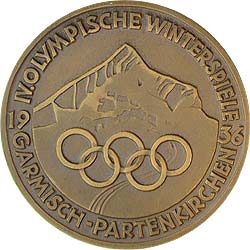|

|

|
|
|
|
|
|
Medal Information |
| |
Summer Olympics
1896 Athens, Greece
1900 Paris, France
1904 St.Louis, USA
1906 Athens, Greece
1908 London, England
1912 Stockholm, Sweeden
1920 Antwerp, Belgium
1924 Paris, France
1928 Amsterdam, Netherlands
1932 Los Angeles, USA
1936 Berlin, Germany
1948 London, England
1952 Helsinki, Finland
1956 Melbourne, Australia
1960 Rome, Italy
1964 Tokyo, Japan
1968 Mexico City, Mexico
1972 Munich, Germany
1976 Montreal, Canada
1980 Moscow, USSR
1984 Los Angeles, USA
1988 Seoul, Korea
1992 Barcelona, Spain
1996 Atlanta, USA
2000 Sydney, Australia
Winter Olympics
1924 Chamonix, France
1928 St.Moritz, Switzerland
1932 Lake Placid, USA
1936 Garmisch, Germany
1948 St.Moritz, Switzerland
1952 Oslo, Norway
1956 Cortina, Italy
1960 Squaw Valley, USA
1964 Innsbruck, Austria
1968 Grenoble, France
1972 Sapporo, Japan
1976 Innsbruck, Austria
1980 Lake Placid, USA
1984 Sarajevo, Yugoslavia
1988 Calgary, Canada
1992 Albertville, France
1994 Lillehammer, Norway
1998 Nagano, Japan
2002 Salt Lake City, USA
| |
|
|
|
|
1936 WINTER OLYMPIAD
GARMISCH, GERMANY
|

Hold mouse over image to view reverse.
If the image does not load, simply hit refresh.
|
Composition: | Bronze |
Shape: | Round |
Diameter: | 60 mm |
Thickness: | 4 mm |
Weight: | 71 grams |
Edge: | Plain |
Mintage: | 1,660 |
Designer: | Kunststickerei M. Jörres |
|
|
| DESCRIPTION |
An extremely rare OPM. The obverse depicts an Alpine summit and the Olympic rings. The legend IV OLYMPISCHE WINTERSPIELE 1936 GARMISCH-PARTENKIRCHEN rests along the periphery. The Olympic motto CITIUS ALTIUS FORTIUS over a fir branch is inscribed on the reverse. Gilt & silvered versions of this medal also exist.
|
THE GAMES |
The 1936 Games were held in the twin Bavarian towns of Garmisch and Partenkirchen. An efficient bus service allowed 500,000 people to attend the final day's events. Alpine skiing events were included for the first time, and this led to a major controversy. The IOC, overruling the International Ski Federation (FIS), declared that ski instructors could not take part in the Olympics because they were professionals. Incensed, the Austrian and Swiss skiers boycotted the events. The dispute carried on after the Games and it was decided that skiing would not be included in the 1940 Olympics. Sonja Henie earned her third gold medal and Karl Schäfer his second. Speed skater Ivan Ballangrud of Norway won three of the four races, including the 500m, the shortest race, and the 10,000m, the longest. Great Britain upset Canada in ice hockey, but it should be noted that ten of the twelve British players lived in Canada.
|
|
|
| |
